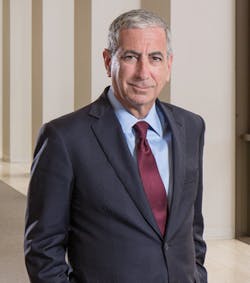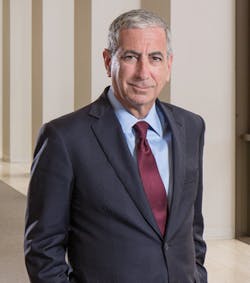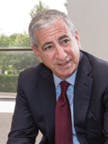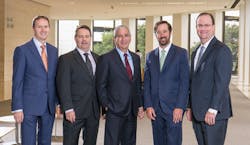Moelis & Company acts as a financial advisor and partner to its clients in some of the most important decisions they make
Photos by Sylvester Garza
EDITOR'S NOTE: Ken Moelis is chairman and CEO of Moelis & Company, a New York-based investment bank that provides strategic advice to a diverse client base, including corporations, governments, and financial sponsors, across all major industry sectors. We caught up with him in Houston recently during a visit to the financial services firm's local office, which focuses on energy.
OIL & GAS FINANCIAL JOURNAL: Ken, your firm, Moelis & Company, was founded just 10 years ago on the brink of the financial crisis, but it has grown to become one of the most influential investment banks in the US with 19 geographic locations in North and South America, Europe, the Middle East, Asia, and Australia. The firm became a top 10-ranked M&A advisor in its first full year of operation, advising on transactions such as Petrobras' $127 billion capital markets and debt markets strategies related to liability management, Anheuser-Busch's $61.2 billion sale to InBev, Yahoo's defense from Microsoft's $44.6 billion unsolicited proposal, and Hilton Hotels' $26.5 billion sale to The Blackstone Group. In the ensuing years, the accolades increased - Best Investment Bank in the UAE; Most Innovative Investment Bank; Restructuring Advisor of the Year; Deals of the Year in 2014 and 2015; Awards for Excellence 2014. First, tell us why you decided to start a new investment bank on the precipice of the financial crisis.
KEN MOELIS: I began my banking career in the 1980s at Drexel Burnam Lambert and over the next two decades I moved from Drexel to Donald Lufkin & Jenrette and finally to UBS. But by 2006, I was president of the investment bank at UBS at the time, it occurred to me that what I had come to enjoy about the industry had disappeared. The tight-knit, service-oriented businesses had merged with big banks to form these massive, global universal banks, and the bureaucratic culture that resulted just didn't appeal to me. We were more focused on being all things to all people rather than providing the best possible service and advice.
So I left UBS in 2006 and started Moelis & Company in 2007 to continue doing what I love, but in an environment where the singular focus was the client. We didn't just want to be an independent advisor, we decided early on that we wanted to be a global firm that provided advice across M&A, as well as capital markets and restructuring. The financial crisis made our ambitions seem lofty, but in hindsight it was a great entrance point for a firm like ours, and I think our counter-cyclical timing has become part of our DNA.
The crisis also put a spotlight on the value of truly independent, unconflicted advice. We see that play out today as clients demand not only independent advisors, but independent advisors who are global, who are discrete, and who are trustworthy. This is highlighted by the assortment of transactions you made reference to - we act as a financial advisor, as a partner, to our clients. And by doing this effectively, we are their long-term partner in some of the most important decisions they make.
OGFJ: There are a number of independent investment banks. Can you elaborate as to how Moelis is different?
KM: As I mentioned, we immediately recognized the importance of being global, while at the same time, being acutely focused on the details of our clients. We knew there was no sense in building a global firm if we didn't foster an environment of teamwork and collaboration. Unlike a lot of other firms, we do not have an "eat what you kill" model. We all share one global P/L, so our clients can count on getting the best advice from globally-coordinated and multi-disciplinary deal teams. We believe our teamwork and execution capabilities are second to none.
Today we employ over 700 people around the world, are present in every major market, and have been able to build out our coverage in new regions counter-cyclically. For example, when big banks were pulling out of Brazil, we saw the significant opportunity that still existed there, and also we were one of the first independent banks to establish a presence in Dubai. In Houston, we made the decision to enter the market and grow our oil and gas team largely during the period when many other firms were contracting due to the cyclical decline in the energy sector.
OGFJ: So you opened a Houston office in 2011 and really started bulking up your oil and gas coverage over the past two to three years. Fast forward to today, you have bankers covering every vertical in the sector. Walk us through the build-out strategy for your oil and gas franchise and what your goals are for the team.
KM: When opening an office like Houston, our strong suit is bringing in deeply-experienced industry bankers and integrating them into our global platform of highly-specialized product bankers. So what does that mean? That means that our clients in Texas and throughout North America get access to our global network through trusted advisors who are industry veterans that know the region inside and out. Since starting this franchise in 2011, we have added and developed expertise across the full spectrum of oil and gas. Our Houston office of around 35 professionals offers a complete suite of advisory services, including M&A (public advisory, private advisory via buy- and sell-side, and A&D), capital markets, and restructuring/liability management.
Our primary focus is to cover our clients on an ongoing basis and help provide solutions for these companies in the upstream, midstream, and oilfield services and drilling sectors. The feedback from our clients has been that we are tremendously helpful to them as they have had to navigate an incredibly challenging market, primarily due to the drop in commodity prices. However, as the market outlook improves, we think we are well-positioned to advise clients who are ready to explore a variety of alternatives, including raising capital and engaging in strategic M&A and A&D opportunities.
Since the beginning of 2015, our global energy team has completed over $700 billion in M&A, capital markets, and debt restructuring transactions for clients in the energy space. As our clients consider the various alternatives I just mentioned and look towards their next stage of growth, we look forward to keeping up this momentum and delivering for them at every opportunity.
OGFJ: Tell us how your team in Houston fits into the global energy picture at Moelis & Company. Is it all oil and gas coverage?
KM: At Moelis, we manage our global oil and gas practice through our two main energy hubs, namely Houston and London, which have professionals that spend a majority of their time in the energy sector. These hubs are supported by industry bankers across our 19 offices around the world, including Dubai, Brazil, Australia, China, India, and Hong Kong (to name a few), with many of our regional bankers having significant energy experience. While our Houston office is largely focused on oil and gas coverage and execution, we also have leading chemicals, infrastructure, power, and utilities groups that dovetail with our oil and gas bankers to provide a seamless and holistic global energy offering.
OGFJ: After a period of prolonged volatility, you mentioned an improving fundamental outlook. That means, for some, it is the right time to consider mergers and acquisitions, as well as growth capital. What are you seeing with your client base regarding this?
KM: As you know, companies in the oil and gas sector have gone through a very challenging time over the past three years, wherein there has been a clear focus on balance sheets and liquidity. We experienced this shift first-hand through our restructuring and liability management expertise, and we assisted many companies in navigating these issues. However, as the markets appear to have stabilized, there are new and different sets of challenges and opportunities. Many companies underinvested during this period, which is leading to capital requirements. It's also become apparent that there are real benefits to consolidation, as well as high-grading assets. As a result, we would envision that both the corporate and asset M&A/A&D markets will continue to accelerate in this environment.
OGFJ: Related to the M&A market, we have seen private equity continue to be quite active - how do sellers prepare for that dynamic?
KM: Private equity always brings a different set of terms, risk appetite, and approach. We are seeing sponsors looking to make investments across the entire oil and gas value-chain. I think the most important thing we can focus on is how the sponsor universe finances these acquisitions. Many lenders are still very cautious about providing capital into levered situations - an understandable reaction born from the challenges faced over the past few years. This likely means that more equity capital will be used to finance transactions as compared with what we saw prior to the cyclical decline.
Aside from upstream, which typically accounts for the largest share of private equity in the oil and gas space, we know sponsors are focused on quality companies and management teams in the midstream and oilfield services and drilling sectors. Suffice it to say, when you combine private equity interest with the industrial logic behind corporate consolidation and mergers, this seems to be an interesting time to think about this strategically for many companies. Ultimately, sellers need to be strategic, consider the long-term vision for their company, and properly assess their value.
OGFJ: For the past seven or eight years, US oil and gas producers have focused on unconventional plays, mainly shale formations. For the past few years, the Permian Basin has been the hottest of all the shale plays. Land prices there have skyrocketed, but upstream companies are still selling assets in other areas to buy into or focus their presence in the Permian, and much new infrastructure is being built there. How long will this West Texas boom continue and does it hamper activity elsewhere, including offshore?
KM: We have seen a significant number of transactions in the Permian Basin, particularly during the first two quarters of 2017, so prices rose dramatically in the region. We are having discussions with companies that had been focused on growing in that basin, and would still be very interested if the right opportunity or transaction were to manifest itself. However, due to the flurry of transactions and very competitive nature of the region, they are looking to deploy capital elsewhere.
Clearly, the Permian Basin will continue to see growth as it is one of the most prolific basins in the world, but we also expect companies to continue to focus on regions across North America to invest capital and drive their growth. Other regions are seeing increased activity such as the Mid-Continent, particularly around the SCOOP/STACK, Appalachia, and even ARKLATEX, are seeing an uptick in activity. As it relates to the offshore and the GOM, these are obviously very large projects that take years to design and complete. We believe that offshore will recover. However, we expect that recovery timetable to be behind onshore. We think you will start to see more activity there, particularly in the Deepwater. There is also a consolidation story developing on the Shelf, as many companies in this region work through their balance sheet challenges, and recognize that bigger is better in this region for a variety of reasons.
While oil appears to have stabilized around $50 to $55 per barrel, the threat of volatility still looms in the back of executives' minds. We constantly hear from companies all along the value and distribution chain that cost reduction is absolutely paramount.
OGFJ: What are some of the ways you have helped your clients think about taking out costs and not just surviving, but thriving in this commodity price environment?
KM: The first big step for a lot of our clients, particularly those in the upstream space, is looking at their portfolio and making a clear decision about the viability of core assets and where they want to invest. That typically leads to the next discussion around divesting non-core assets. These tend to be costly and capital-intensive businesses that, at the current breakeven cost, create little to no value for the company. Conducting both of those exercises strengthens the company's financial position. We have seen companies throughout the oil and gas value chain tighten their belts dramatically in this environment, from reducing workforce to pushing their vendors and suppliers to cut prices. Much of this has been very good for the industry, as companies are laser-focused on the entire income statement. But some of these costs have to be reintroduced as the industry recovers - there is a requirement for labor, increases in wages, and increases in service costs in order to make adequate returns. As mentioned earlier, strategic transactions have also created an opportunity to find synergies and take out costs.
OGFJ: How will renewable energy impact the oil and gas sector globally?
KM: As a result of the volatility and price pressure, we have seen a rebalancing of the oil and gas sector over the last couple of years that should help the industry remain competitive and strong. Costs are coming down, and consolidation and technology have helped reduce breakeven levels. While we expect to see renewable power generation continue to increase, it still only represents less than 20% of total demand in the United States. Demand for oil and gas is rapidly expanding in emerging markets, which creates greater opportunities abroad.
"As the markets appear to have stabilized, there are new and different sets of challenges and opportunities. Many companies underinvested during this period, which is leading to capital requirements. It's also become apparent that there are real benefits to consolidation, as well as high-grading assets. As a result, we envision that both the corporate and asset M&A/A&D markets will continue to accelerate in this environment."
LtoR: Adrian Goodisman, managing director, upstream oil & gas; Bryan Lastrapes, managing director, upstream oil & gas; Ken Moelis, founder, chairman, and CEO; Brian Jinks, managing director, midstream oil & gas and MLPs; David Cunningham, head of US oil & gas and oilfield services. Not pictured: Bassam Latif, managing director, oil & gas restructuring; and David Bradshaw, senior advisor, upstream oil & gas.
OGFJ: Activist pressure in both oil and gas and power and utilities has increased recently. Tell us how you've seen activist campaigns change and how Moelis & Company works with companies facing activists?
KM: The same forces that make for a constructive deal-making environment also help grow activist pressure, so we see that theme continuing to play out. For oil and gas companies that have navigated the volatility well, shareholders want them to go out and put their excess capital to work, but some shareholders are very specific as to how they think companies should put that capital to work. In contrast, for companies that have lingering balance sheet or liquidity issues, some shareholders are applying pressure. In the current environment, activists are making recommendations ranging from not doing M&A, to pushing for consolidation, to breaking up companies for a sum-of-the-parts valuation. Simply put, shareholders are becoming more active and have views that span the entire spectrum of alternatives a company may consider pursuing.
We think that these types of situations highlight the importance of working with an independent advisor, and how important it is to avoid conflicts of interest.
OGFJ: You mentioned your presence in Dubai earlier, and I wanted to ask about the activity we have seen out of the national oil companies in the Middle East. In October, you were listed as an advisor to Abu Dhabi National Oil Company on the $3 billion bond offering by its subsidiary, Abu Dhabi Crude Oil Pipeline LLC. There have also been numerous stories in the international press about the planned IPO of Saudi Aramco. Earlier this year, various media outlets mentioned that Moelis & Company has been chosen as the sole independent adviser for that IPO. If these reports are accurate, this would be a real coup for Moelis and would represent the biggest equity advisory mandate to date. What, if anything, can you tell us about this?
KM: Our role advising ADNOC on the $3 billion bond offering by its subsidiary, ADCOP, is very-much in the public domain via the offering documents. But, beyond that, I will let the transaction speak for itself. It was one of the largest asset-backed bond offerings in the history of the region, and ADNOC and its subsidiary have been very clear about the use of proceeds. As I mentioned earlier, confidentiality is at the core of our business. We pride ourselves on our discretion and therefore do not discuss stories in the press or any client business.
OGFJ: What aspect of your business keeps you awake at night?
KM: What I am most concerned about is our access to top-level junior talent. I think the same reasons I left UBS 10-or-so years ago - the bureaucracy, lack of focus on clients, the consolidation in banking that took the culture and excitement out of being a banker - has trickled down to the young college graduates who are about to launch their careers. Thirty years ago, the top 5% of college graduates were excited to start a career on Wall Street. They were attracted to the high-profile work they could do right out of the gate, and the comradery of working on a team of brilliant people to find solutions for the world's largest companies.
That opportunity is still there and that work is as important as ever, but today, that same 5% have the opportunity to go into lucrative careers at tech companies and startups, which are attractive because they offer new recruits a chance to be innovative, to scratch their entrepreneurial itch. That's what I think got squashed as those universal, behemoth banks were created over the last two decades.
At Moelis we foster a tight-knit culture that encourages innovation and celebrates entrepreneurship. Our clients, many of which are the world's largest multinational corporates, rely on us for advice, and I continue to believe that advising these clients through the strategic decision-making process is one of the best professional experiences out there - and one of the few professions where, even as a young banker, your work has real impact.
As you can tell from our conversation, there are a number of disruptive forces at play, not just in energy, but across every industry. I think banking puts you on the forefront of disruption, challenges you to think critically about how the world is being changed, and to actively take part in shaping it.
OGFJ: Thanks for taking time to talk with us, Ken.



